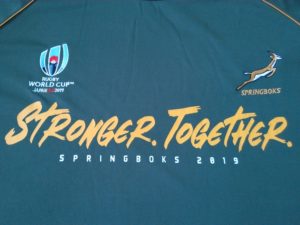Go Bokke

“It always seems impossible until it’s done”
– Nelson Mandela
I remember Rugby World Cup (RWC) finals clearly, by the places we found ourselves in. Sometimes we’ve travelled especially to watch a match; meandering over potholes in local buses to reach the Copperbelt, flying to Johannesburg to go to the epic Ellis Park stadium, venturing out to one of Nairobi’s nastiest night spots with big screen TVs. All of it, in the name of ‘a hooligan’s sport, played by gentlemen’.
Our first RWC together was in 1999. We were renting a damp, tiny flat in a commuter belt town outside London and found a nearby Irish bar. We watched England play Argentina on my 30th birthday, amazed at a promising young kicker called Johnnie Wilkinson. Four years on, in 2003, we had just moved back after working in Japan and were renting an attic apartment in the centre of Liverpool. We watched the match against Australia in a local pub. Wilkinson had matured into a brilliant player and England won the match triumphantly.
In 2007 we had just moved to Dubai to begin jobs teaching in an international school. We barely knew our way around the city, after just a few weeks there. We found a sports bar where the game was being shown, England vs South Africa. I remember John Smit’s team over-powering England. The Springboks won 15-6.
Twelve years on we settled in to watch these two big teams play each other again. This time, we were in the Mother City. Both teams had fought impressive campaigns to reach the final. SA had outplayed Namibia, Canada and Italy. England had dismantled New Zealand’s usually mighty and indomitable All Blacks. Going into the RWC final, England was the favourite.
I watched the build up to this clash with great interest. South Africa had one less day to prepare than England and had to quickly ‘maak ‘n plan’ after their 19-16 victory over Wales. England and South Africa had played each other four times over the last 18 months, with two wins a piece. Social media was abuzz, with news from both sides. I remembered Mandela’s vision, to use the RWC to unite the nation in 1995, something that is needed now. South Africa, like numerous countries around the world, has many problems.
Matt Proudfoot, the Springboks forwards coach, tried to share a bit about what the Springboks mean to many South Africans: “South Africa as a country has got a lot of challenges, but we are resilient people. We understand what it means to live at the tip of Africa… The Springbok is the tool people use as a symbol of hope, a symbol of opportunity. It shows, if you look at the stories of the players in the team, what can be achieved with hard work”.
Rassie Erasmus, South Africa’s director of rugby, didn’t shy away from the fact that he thought that the Springboks faced a massive test taking on England. SA was the underdog on the pitch. And off the pitch, South Africa is a developing country, with so many obstacles to overcome.
South Africa won the match 32-12 and were crowned the new RWC Champions. A win means so much to the country. A good friend summed it up, saying “The country needed this to unite us and lift our spirits”.
Siya Kolisi, the impressive Springbok Captain, grew up in the township of Zwide in Port Elizabeth. He was selected for the Eastern Province Under 12B team. Over the years he rose through the ranks in rugby, made it to the national team and then became Captain. Siya, you sang Nkosi Sikelel’ Afrika with pride, you played with passion and you led your team to victory.
Today belongs to the Rainbow Nation.
South Africa can feel proud of winning three RWC titles. There is talent and ability the world over. And there are so many positive stories to come out of the vast, luminous continent of Africa. This is just one of them.
Where were you watching the 2019 RWC?
©Maggie M /Mother City Time